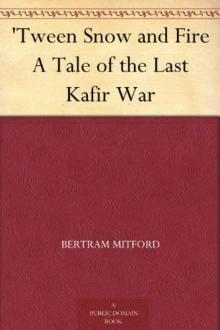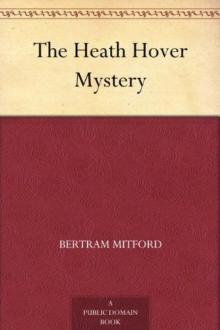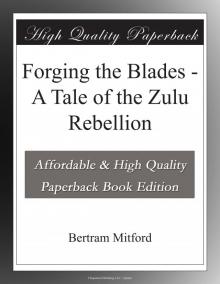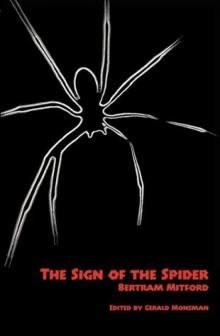- Home
- Bertram Mitford
The Red Derelict Page 3
The Red Derelict Read online
Page 3
CHAPTER THREE.
FATHER AND SON.
The exclamation possessive which had escaped Wagram as he contemplatedHilversea Court and its fair and goodly appurtenances, was, as a matterof hard fact, somewhat "previous," in that these enviable belongingswould not be actually and entirely his until the death of his father; aneventuality which he devoutly hoped might be delayed for many and many along year. Yet, practically, the place might as well have been his own;for since the motor car accident which had, comparatively speaking,recently cut short the life of his elder brother, and he had taken uphis quarters at Hilversea, the old Squire had turned over to him thewhole management, even to the smallest detail. And he had grown to lovethe place with a love that was well-nigh ecstatic. Every stick andstone upon it, every leaf and blade of grass seemed different somehow tothe like products as existing beyond the boundary; and there were timeswhen the bare consciousness that he was destined to pass the remaininghalf of his life here, was intoxicating, stupefying--too good indeed tolast. It seemed too much happiness for a world whose joys arenotoriously fleeting.
While hurriedly dressing for dinner Wagram's mind reverted to the recentadventure. The old Squire had procured the African antelopes atconsiderable trouble and expense; in fact, had made a hobby of it. Hewould certainly not be pleased at the outcome of the said adventure; andthe duty of breaking distasteful news to anybody was not a palatable oneto himself. And the girl? She seemed a nice enough girl, andunmistakably an attractive one; and at the thought of her Wagram got outa telegraph form and indited a hasty "wire" to the London agency of awell-known cycle firm. Then he went down, a little late, to find hisfather ready and waiting.
The old Squire was a tall man of very refined appearance, and carriedhis stature, in spite of his fourscore years, without stoop or bend, andthis, with his iron-grey moustache, would cause strangers to set himdown as a fine specimen of an old soldier--which was incorrect, for hehad spent the working period of his life in the Diplomatic Service.
"Well, Wagram, and what have you been doing with yourself?" he said, asthey passed into a gem of a panelled room looking out upon a lovelypicture of smooth sward and feathery elms. It was the smallerdining-room, always used when father and son were alone together.
"Oh, I crept around with the rabbit rifle--a sort of combination ofkeeping my hand in, and at the same time admiring the evening effects."
"Did you get any good shots?"
"H'm, rather," thought Wagram to himself drily. Then aloud, "Do youknow anybody in Bassingham, father, by name Calmour?"
"Calmour? Calmour?" repeated the old man dubiously. "I seem to knowthe name too, but for the life of me I can't fit it with an owner.Rundle," as the butler entered, "do I know any Calmour in Bassingham?"
"Well, sir, it's Major Calmour. Lives at Siege House, just this side ofthe bridge, sir." And Wagram thought to detect a subtle grin droopingthe corners of the man's well-trained mouth as he filled the Squire'sglass.
"To be sure, to be sure. Now it all comes back. Major Calmour! Ho--ho--ho! Wagram, that's the man right enough. Why? Has he been writingto you about anything?"
"No. But--who is he, anyway?"
"He is a retired army veterinary surgeon, addicted to strong drink, anda wholly unnecessarily lurid way of expressing himself."
"I know the species. What sort of a crowd are his descendants?"
"His descendants? I believe they are many. Their female parent was,they say, even more partial to _aqua vita_ than their male; indeed,report sayeth that she died thereof. One, by the way, obtained largedamages from Vance's eldest fool in an action for breach of promise. Ibelieve the family has been living on it ever since."
"Which of them was that?" said Wagram carelessly, wondering if it wasthe heroine of the afternoon's adventure.
"I don't remember. Which of them was it, Rundle?"
"I believe it was the second of the young ladies, sir," supplied thebutler, who, being an old and privileged and, withal, discreet familyservant, was often consulted by the Squire as to local and personalmatters when memory proved defective. The answer, no name having beenmentioned, of course conveyed no information to Wagram. So the heroineof the adventure was the daughter of a tippling and disreputable ex-Armyvet. Well, she was not lacking in pluck and readiness of resource, atany rate.
"I made the acquaintance of one of the girls this afternoon, father, andthat in rather a queer way," he said.
"Ah, really; and how was that?"
Then Wagram told the story, told it graphically, too. The Squire,listening, was taken quite out of himself.
"Why didn't you shoot the brute, Wagram? You had the rifle."
"Oh, I didn't want to do that as long as it could possibly be avoided.It couldn't in the long run. But the girl shot him instead. Had to."
"The girl shot him?"
"Yes! I'm coming to that." And then as he narrated the progress of hishand-to-hand struggle, and the relief just in the nick of time, theSquire burst forth with:
"Splendid! Splendid! There's nerve for you. You'd certainly have beenkilled Wagram. Why, man, did you think you were a match for the beastby sheer force of strength? Why, you might as well have tried the samething on with a bull. Ah well, it's a pity, but it's lucky it was noworse. Lucky too, you were about, or that poor girl would have beenkilled or, at best, seriously injured. But how did the thing get out?This is within Hood's responsibility."
"I sent him at once to see," answered Wagram. "Perrin opined that itjumped the palisade, and that's not impossible. I gave them particularinstructions about the head. It's worth keeping. We'd better send itto Rowland Ward's to be set up."
"Yes." And then the old squire became rather grave and absent-minded,and both men ate their dinner for a while in silence. In the mind ofthe elder was running the thought of what an awful thing had beenavoided. His son might easily have met his death--this son from whom hehad been estranged for years, and from whom now, he wondered how hecould have spent those years of his old age apart. His glance wanderedfurtively to a portrait upon the wall. It was that of another son--ayounger one--Wagram's half-brother; a handsome, reckless face, but therewas a shifty look in the narrowness between the eyes, that even thetravesty of the portrait painter's art could not altogether hide. Foryears past this one's whereabouts had been a mystery; even his fate--even were he alive or dead. He had left home in a hurry and in anger,had left perforce to avoid a great scandal and disgrace, wherein,moreover, a question of felony was involved. This had befallen morethan ten years earlier, and almost ever since nothing had been heard ofthe exile. When last heard of he was in Australia, then to allinquiries there was a blank, and as time went on, more and more didthose he had left assume that he was dead.
For the wanderer's own sake, the old squire in his heart of hearts couldalmost have brought himself to hope so. For of Everard Wagram the bestdescription had been "a bad lot"--an all round bad lot, and for yearshis father and brother had lived in secret dread of any day hearing hehad come to a bad end. Now gazing at the portrait, the old man wasfurtively making comparison between its original and Wagram; wondering,too, for the hundredth time, not that there should be any differencebetween them, but that their characters should be so entirely andcompletely divergent. But they were of different mothers, and behindthis fact lay a good deal. They had both had the same chances, butdifferent mothers, and the younger man had gone utterly to the bad.
"Did you say the young lady's bicycle was smashed, Wagram?" said theSquire at last, reverting to the adventure.
"All to smithereens. But I've drawn up a wire to Gee and Vincent tosend her the latest thing up to date, and that sharp. I've also writtenWarren to let her have one on hire until it comes."
"Yes, that's quite right. But I doubt if it'll end there. Calmour'squite capable of threatening an action for damages with a view tocompromise. He's a most astonishing cad, and chronically hard up."
"Poor devil. In th
e latter line he has my sympathy," said Wagram. "Butit wasn't he who got damaged, it was the girl."
"That's just it, and that's where he'll score. If she's put in the box,from your description of her the conscientious and respectable Britishjury that won't give her damages doesn't exist."
"I can hardly think she'd be a party to anything of that sort," rejoinedWagram. "She seemed to me a nice sort of a girl; too nice, in fact, tolend herself to that kind of thing."
The Squire's head shot up quickly, and for a moment he looked at his sonwith grave concern. The two were alone together now.
"Don't you know lovely woman better than that even by this time,Wagram?" he said.
"Well, I ought to," was the answer, beneath the tone of which lurked abitterness of rancour, such as seldom indeed escaped this man, normallyso equable and self-possessed with regard to the things, so tolerant andconsiderate towards the persons, about him.
"I should say so," assented the Squire; "and I'll bet you five guineasyour acquaintance with this one doesn't end where it begun."
"I don't see how it can. If it hadn't been for her I should almostcertainly have lost my life."
"If it hadn't been for her your life would not have been in danger, sothe situation is even all round."
Wagram laughed.
"There's something in that, father. But you say these are absolutelyimpossible people?"
"Absolutely and entirely--dangerous as well. Didn't I tell you just nowabout one of them and Vance's eldest idiot? Why, for all we know, itmay have been your heroine of to-day."
"It may, of course. Still I have an instinct that it was probably oneof the others. Wouldn't it be the right thing if I were to call andinquire after the girl, make sure she's none the worse for her spill.It would be only civil, you know."
"Civil but risky. If you did that it wouldn't be long before Calmourand some of them returned it. They'd jump at the opportunity. ACalmour at Hilversea! Phew! It would be about as much in place as acow in a church."
"That makes it awkward certainly."
"Doesn't it? Besides, I don't see that what you suggest is in the leastnecessary. The girl on your own showing, wasn't hurt. Her bicycle gotsmashed, and we are sending her a new one, probably ten times as good asthe one she had before. Moreover we've lost one of our Africanantelopes. Upon my word I think the house of Calmour is far moreindebted to us than we are to it. Just shut that window, Wagram. It'sbeginning to get a little chilly."
The sweet, distilling air of meadow and closing flower greeted Wagram'snostrils as he lingered while obeying, and from the gloaming woodlandscame the weird, musical hooting of owls, and again he felt that intense,ecstatic thrill of possession sweep through his being. And as he turnedfrom the window, he heard the Squire repeat, this time half to himself:
"A Calmour at Hilversea! Pho!"

 John Ames, Native Commissioner: A Romance of the Matabele Rising
John Ames, Native Commissioner: A Romance of the Matabele Rising The Induna's Wife
The Induna's Wife 'Tween Snow and Fire: A Tale of the Last Kafir War
'Tween Snow and Fire: A Tale of the Last Kafir War The Heath Hover Mystery
The Heath Hover Mystery The Sirdar's Oath: A Tale of the North-West Frontier
The Sirdar's Oath: A Tale of the North-West Frontier The Triumph of Hilary Blachland
The Triumph of Hilary Blachland Forging the Blades: A Tale of the Zulu Rebellion
Forging the Blades: A Tale of the Zulu Rebellion The Red Derelict
The Red Derelict The Ruby Sword: A Romance of Baluchistan
The Ruby Sword: A Romance of Baluchistan The Fire Trumpet: A Romance of the Cape Frontier
The Fire Trumpet: A Romance of the Cape Frontier The Sign of the Spider
The Sign of the Spider